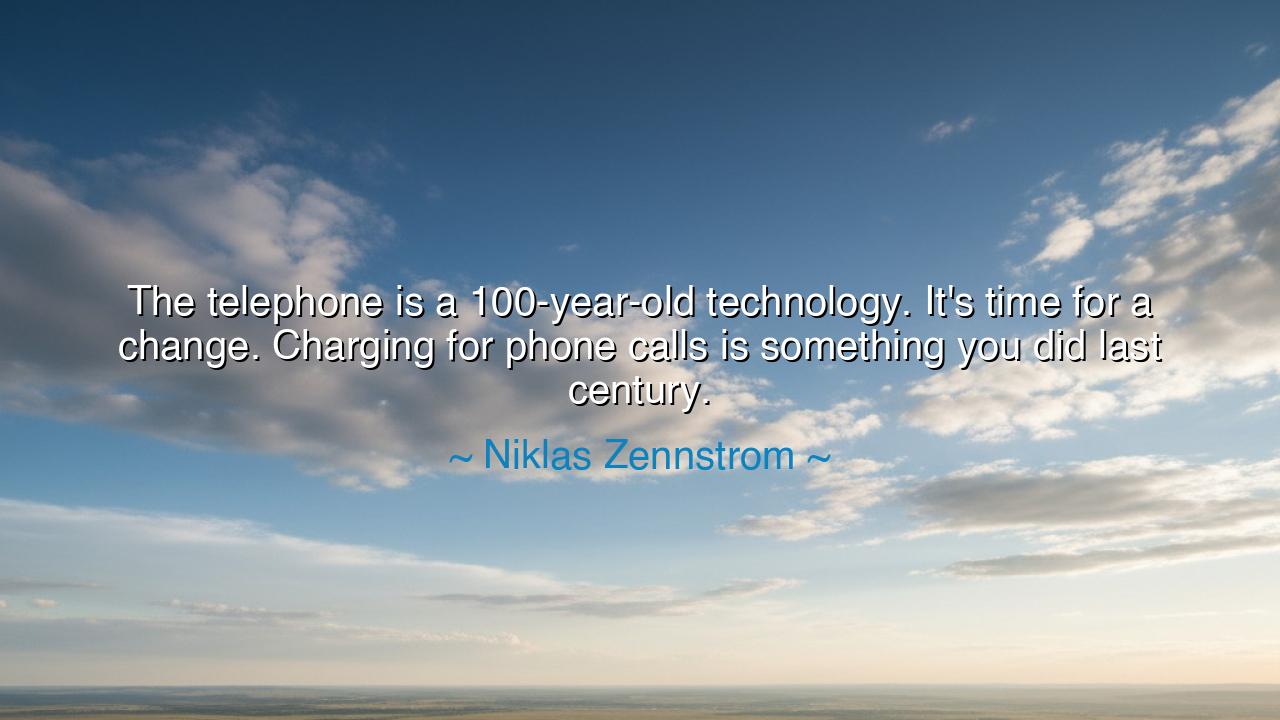
The telephone is a 100-year-old technology. It's time for a
The telephone is a 100-year-old technology. It's time for a change. Charging for phone calls is something you did last century.






Hear the bold words of Niklas Zennstrom, pioneer of Skype and breaker of old monopolies, who declared: “The telephone is a 100-year-old technology. It’s time for a change. Charging for phone calls is something you did last century.” These words, fierce and prophetic, did not merely describe a shift in business, but marked the dawn of a new order in human communication. For Zennstrom saw that the telephone, once a miracle of connection, had become bound in chains of profit, clinging to an old model while the tides of the Internet promised freedom.
The telephone had been born of wonder. When Alexander Graham Bell first sent voice across wires, it shattered the silence of distance and made the world smaller. For a century, it grew in power, spreading lines across cities, seas, and continents. Yet with it also grew the toll of cost. Every call, every moment of speech carried a price, measured not in words but in currency. In the age of wires, this seemed natural. But Zennstrom, standing at the gates of the digital age, saw such charges as relics of the past, clumsy weights dragging humanity down when the technology of the present could make speech as free as air.
Consider the rise of Skype, the child of Zennstrom’s vision. While the old phone companies clung to their billing meters, Skype leapt into the currents of the Internet, carrying voices across oceans at no cost. Suddenly, families separated by continents could speak daily without fear of the bill. Businesses could collaborate across borders as if seated in the same room. The tyranny of distance, once exploited for profit, was undone by the boundless power of digital networks. In this way, Zennstrom’s words were not boast, but battle cry: a declaration that communication belonged not to the few, but to all.
History, too, has seen such transformations. When printing first emerged, scribes who sold costly manuscripts feared the ruin of their craft. When the railroads expanded, old merchants who charged dearly for slow caravans were swept aside. In every age, an entrenched power clings to an old way, charging heavily for what has become scarce. And in every age, a new invention arises that makes the scarce abundant, the costly free. Zennstrom’s declaration is simply one more turning of this eternal wheel: that what was rare yesterday becomes common today, and what was charged in gold yesterday must be offered in freedom tomorrow.
The deeper meaning of his words is this: technology must not serve only the guardians of old profits. It must serve the people, the dreamers, the families, the voices yearning to be heard. The telephone chained by cost was a marvel turned into a cage. The Internet, unburdened by distance, broke that cage and made communication universal. To cling to the old model is to dwell in a ghost of the past; to embrace change is to step into the living future.
The lesson for us is both practical and eternal. Do not cling to the ways of yesterday simply because they once brought power or wealth. Ask instead: Does this serve humanity now? Does this model still fit the age in which we live? If it does not, then it is time for a change, no matter how sacred the tradition once seemed. For every age brings its own tools, and with them, new responsibilities. The wise are those who release the old when it no longer serves, and embrace the new with courage and vision.
Therefore, beloved listener, take action. Embrace the tools of your age, and do not be bound by the chains of last century’s models. Use the Internet, use free communication, use the gifts that technology has made abundant. But also remember: what is abundant today must be used wisely, for abundance too can be wasted. Let your words be many, but let them also be meaningful. Speak often, but speak with purpose, so that the freedom gifted to you becomes not noise, but connection.
Thus the words of Niklas Zennstrom endure like a trumpet blast: “Charging for phone calls is something you did last century.” Let them remind you that the world moves forward, that technology frees what was once imprisoned, and that true progress is not in hoarding profit, but in liberating humanity. For the age of costly silence is past; the age of free voices has begun.






AAdministratorAdministrator
Welcome, honored guests. Please leave a comment, we will respond soon